The best interactive voice response (IVR) system features an easy-to-navigate call flow editor, enabling users to drag and drop different menu elements. Its advanced voice recognition capability lets customers choose among options and be directed to the right departments without much effort. IVR systems enable self-service—answering frequently asked questions, offering customer request updates, and facilitating secure payments.
Ultimately, IVR accelerates the resolution of customer concerns and frees live customer service representatives from menial tasks. This article outlines the top IVR systems for small businesses.
- RingCentral: Best Overall for High-volume Calls
- Nextiva: Best for Conversational IVR
- CloudTalk: Best for Targeted Call Routing
- Genesys Cloud: Best for Customer Self-service
- Vonage: Best for Scalability
- Twilio: Best for Custom Voice Workflows
Best IVR Systems Compared
Vanity Phone Number Providers | Monthly Starting Price (per User) | Key Features | FSB Rating |
|---|---|---|---|
$30 |
| 4.49 out of 5 | |
$30.95 |
| 4.42 out of 5 | |
4.11 out of 5 | $25 |
| 4.11 out of 5 |
4.06 out of 5 | $17 |
| 4.06 out of 5 |
4.00 out of 5 | $19.99 |
| 4.00 out of 5 |
3.54 out of 5 | 1.4 cents to make local calls and 0.85 cents to receive |
| 3.54 out of 5 |
Revisit how IVR works and offers various benefits to businesses by checking our comprehensive guide on what IVR is. See the list of features to know what to consider when choosing a software solution.
RingCentral: Best Overall for High-volume Calls

What We Liked
- Easy drag-and-drop IVR designer interface
- Up to 250 voice menus and submenus per account
- Generous toll-free minute allowance
Where It Falls Behind
- Slightly more expensive than other providers
- Users must pay an extra fee for live reporting of call queue statuses
- Integrations are limited in the entry-level plan
RingCentral Monthly Pricing (per User)*
- Core: $30 per user for unlimited domestic calling, 100 toll-free minutes, multi-level auto-attendant, and basic call queues
- Advanced: $35 for 1,000 toll-free minutes, up to eight-digit extensions, advanced call queues and call monitoring, and hot desking
- Ultra: $45 for 10,000 toll-free minutes, device analytics and alerts, and unlimited storage for files, messaging, and recordings
- Free trial: 14 days
*Save up to 33% by paying annually; volume discounts for 50-plus users are available.
RingCentral is the best IVR system for handling high-volume calls, as it lets users easily set up and manage phone menus through its intuitive visual IVR editor. By clicking the phone icon, you’ll see all the different options for creating a phone tree: new or existing menu, transfer directory, voicemail, or extension. As you add these elements, the phone system automatically assigns the key press numbers.
The voice-over-internet protocol (VoIP) phone system offers a maximum of 250 voice menus and submenus per account. You’re able to add a direct number for each menu, separate from your main company number. With a multi-level routing menu, your phone system is able to distribute phone calls to various destinations.
The best thing about RingCentral is its integration with over 300 third-party apps. By connecting the platform to customer relationship management (CRM) tools, you’ll get screen pop-ups displaying customer information while on a call, helping you get the full context of the caller’s concern.
Unfortunately, RingCentral offers live reporting for call queue management as an add-on only. Consider another IVR system for small businesses if this is your priority. On Genesys Cloud, real-time reporting and performance dashboards are features included in all subscription plans.
RingCentral Features
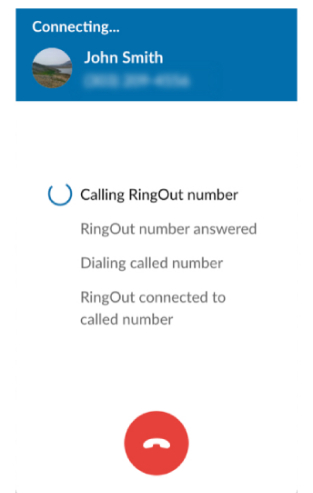
RingOut lets you use your landline or mobile phone number to make an external call. (Source: RingCentral)
- Call flip: Transfer a call from one device to another with only one click. If you initially picked up a call on your desktop app but want to continue the conversation when you step away from your desk, use call flip to move the call to your mobile phone.
- RingOut: When you have an unstable internet connection, use a landline or mobile phone to call. RingOut calls your device first, then connects to the recipient you’re trying to reach, showing your RingCentral phone number as caller ID.
- Call park: Put a live call in a communal parking spot and let other team members more qualified to accommodate the concern pick it up. RingCentral features 100 park locations and a five-minute timeout.
Nextiva: Best for Conversational IVR

What We Liked
- Allows secure credit card payments over the IVR solution
- Unlimited conference calls for unlimited participants
- Free local and toll-free number
Where It Falls Behind
- Entry-level plan doesn't have a multi-level auto-attendant
- Voicemail transcription is exclusively offered in the most expensive subscription package
- Limited third-party integrations
Nextiva Monthly Pricing (per User)*
- Essential: $30.95 for unlimited domestic calling, up to 1,500 toll-free minutes, auto-attendant, and call history
- Professional: $35.95 for multi-level auto-attendant, voicemail-to-SMS notifications, and integration with Salesforce, HubSpot, and Microsoft Dynamics 365
- Enterprise: $45.95 voicemail transcription, single sign-on, and enterprise integrations
- Free trial: 7 days
*Save up to 27% by paying annually; volume discounts are available for more than five users.
Nextiva is our top-recommended IVR system for businesses wanting to offer a hands-free solution for customers reaching their phone lines. Callers don’t have to press keypad numbers from the menu instructions, as Nextiva’s advanced IVR is equipped with natural language processing (NLP) technology. This functionality lets callers verbally share their concerns and receive the help they need.
The conversational IVR is beneficial in many ways, from informing customers about their order status and sending certain callers to agents right away to collecting credit card payments. The downside of choosing Nextiva is its voicemail transcription feature is locked behind its most expensive plan, priced at $45.95. In contrast, the IVR phone system Vonage offers this feature in all its packages, including its entry-level plan at $19.99 per user.
Nextiva Features
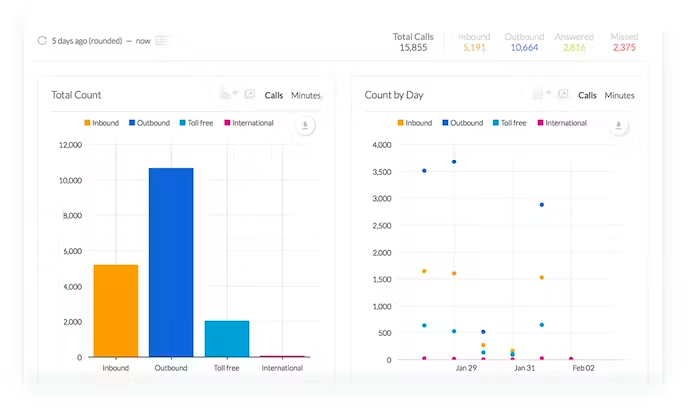
Get an overview of your call center performance with Nextiva’s call analytics.
(Source: Nextiva)
- Call forwarding: Redirect specific calls to a phone number, extension, or device when you can’t answer customer concerns for a certain period. Configure the conditions for the calls that will be forwarded: always, for certain phone numbers, when busy, unanswered, or unreachable.
- Call presence: See quickly which team members are available for calls. Presence shows the user’s status: available, on a call, unavailable (do not disturb), or offline.
- Call analytics: Measure the performance of individual customer service agents and teams by looking at different call center metrics. Aside from real-time reporting, Nextiva lets managers create custom reports based on what they want to evaluate.
CloudTalk: Best for Targeted Call Routing

What We Liked
- Unlimited users in all subscription plans
- Unlimited number of callers in queues
- Allows users to set up VIP queues
Where It Falls Behind
- SLA is locked behind the most expensive plan
- Entry-level package only offers one month of recording storage
- Doesn’t provide discounts for annual billing
CloudTalk Monthly Pricing (per User)
- Starter: $25 for call queueing, call recording, call flow designer, and one-month recording storage
- Essential: $30 for caller-based routing, preferred agent, automated call redirection, interactive voice response (IVR) menu, and unlimited recording storage
- Expert: $50 for Go-To call flow designer feature, VIP queues, smart detection of resolved missed calls, and mandatory tagging
- Custom: Custom pricing for custom reporting, service level agreement (SLA), and dedicated account manager
- Free trial: 14 days
Among the best IVR systems listed here, CloudTalk is the best option for routing calls based on who’s on the other end of the line. It lets users create a call flow for specific phone numbers. Its preferred agent feature allows businesses to assign service representatives for certain clients. Through VIP queues, the most valuable customers don’t have to wait in line and can be sent immediately to a service representative.
CloudTalk features skills-based call routing, with inquiries distributed according to the team or agent best equipped to accommodate specific concerns. Before choosing CloudTalk, note that its service level agreement (SLA) is only available in the most expensive plan, which carries custom pricing. Other IVR phone systems like RingCentral offer a 99.999% uptime guarantee in all its subscription packages, including its entry-level plan priced at $30 per user.
CloudTalk Features
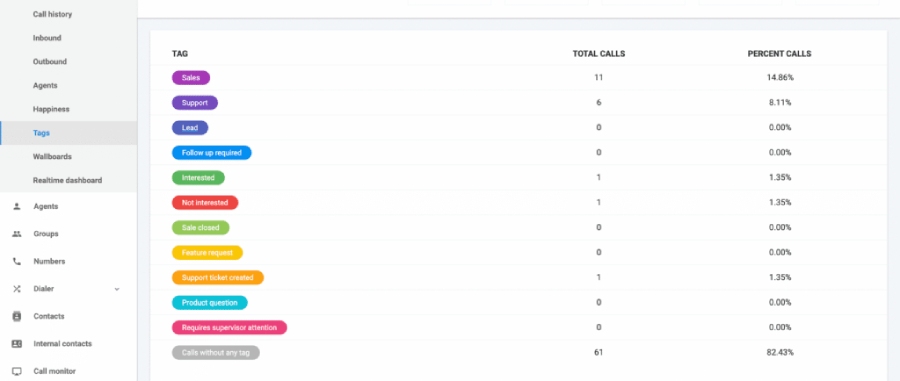
Tag calls on CloudTalk for easy reference. (Source: CloudTalk)
- Call tagging: Put labels on phone calls according to specific criteria. The tags can be based on the type of inquiry, like “Sales” and “Support,” or the kind of lead, such as “Interested” or “Needs follow-up.” These custom tags will let you easily revisit customer inquiries.
- Real-time customer card: See a customer’s information quickly during a live call. The phone system automatically shows the caller’s profile when you get an incoming call alert.
- Call barge: Join the conversation between an agent and a customer if you need to address both directly. Like IVR, this feature helps speed up the resolution of concerns.
Genesys Cloud: Best for Customer Self-service

What We Liked
- IVR system recognizes human language
- Over 300 third-party integrations
- Analytics and reporting feature is available in all subscription plans
Where It Falls Behind
- Most expensive among the providers listed here
- Doesn’t offer a monthly billing option
- Limited reporting capabilities
Genesys Cloud Monthly Pricing (per User)*
- CX1: $75 for call routing, voicemail, callback, outbound campaigns, and speech-enabled IVR
- CX2 Digital: $95 for access to digital channels (unlimited chat and email routing, SMS, and messaging apps), co-browse, screen and interaction recording, and quality management and compliance
- CX2 (Digital + Voice): $115 for access to digital channels, call routing, outbound campaigns, and quality management and compliance
- CX3 (Digital + Workforce Engagement Management [WEM]): $135 for access to digital channels, workforce management, and speech and text analytics
- CX3 (Digital + WEM + Voice): $155 for access to digital channels, call routing, outbound campaigns, and workforce management tools
- Free trial: 30 days
*The provider only offers annual billing.
Genesys Cloud is the best among call center IVR systems for promoting customer self-service because it offers visual IVR. This tool combines traditional IVR that announces the self-service option and a web application that allows callers to choose and tap menu choices using their smartphones or desktops. With a robust system handling several concerns, your agents focus on managing high-value tasks, like upselling or cross-selling.
Aside from the visual IVR, Genesys Cloud promotes self-service with its adaptive IVR, wherein the call flow dynamically adjusts according to the customers’ needs. While Genesys Cloud is a great choice of IVR system for call centers, it carries expensive subscription fees. Its entry-level plan costs $75 per user. Vonage is the most affordable phone system listed here, with a base-level package available at $19.99 per user.
Genesys Cloud Features
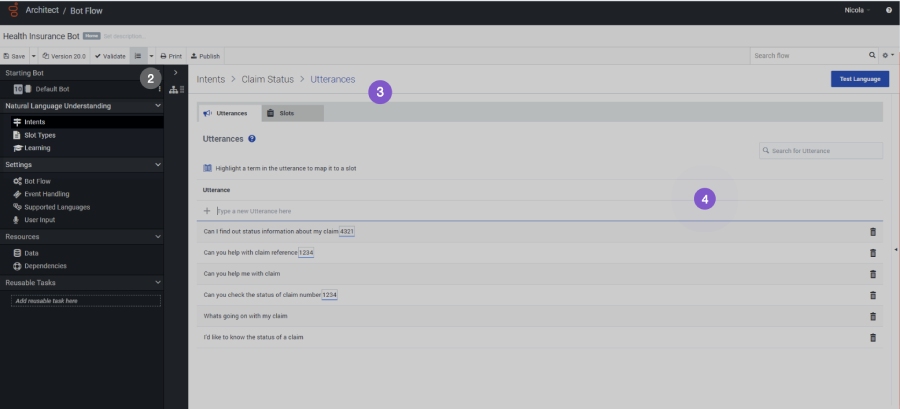
Create a voicebot to address common customer concerns. (Source: Genesys)
- Agent collaboration: Let team members communicate easily with each other through chat and video calls. Genesys Cloud allows users to share screens and manage documents together.
- Voicebot: Offer customer service without downtime. Voicebots are able to answer calls 24/7 and transfer customers to human representatives if necessary.
- Bullseye routing: Distribute calls to a group of customer service representatives with specific skills. If no agent takes the call, the system automatically expands the pool of agents to deliver faster customer service.
Vonage: Best for Scalability

What We Liked
- 99.999% uptime guarantee
- Mobile app offers robust features like the desktop version
- Admin console allows users to manage calls more efficiently
Where It Falls Behind
- Call group is locked behind the most expensive subscription package
- Lacks multi-level auto-attendant in the entry-level plan
- Third-party integrations are limited to 20+ apps only
Vonage Monthly Pricing (per User)*
- Mobile: $19.99 for unlimited calls and SMS, access to Vonage app center, and mobile and desktop apps
- Premium: $29.99 for multi-level auto-attendant, IP desk phone capability, and integration with customer relationship management (CRM) tools
- Advanced: $39.99 for on-demand call recording, call group, and visual voicemail
*Volume discounts are available for more than five users.
Vonage is among the best IVR systems for scalability because its a la carte pricing model lets you add more call management features when business communication demands increase. The multi-level auto-attendant feature is available in its Premium and Advanced subscription plans. Add call queues, secondary line appearance, and virtual phone extensions to complement the IVR system in managing seasonal surges in the number of customer inquiries.
Unfortunately, Vonage only integrates with 20-plus third-party platforms. RingCentral and Genesys Cloud connect with over 300 apps. Consider these IVR solutions if you plan to use other business software with your phone system.
Vonage Features
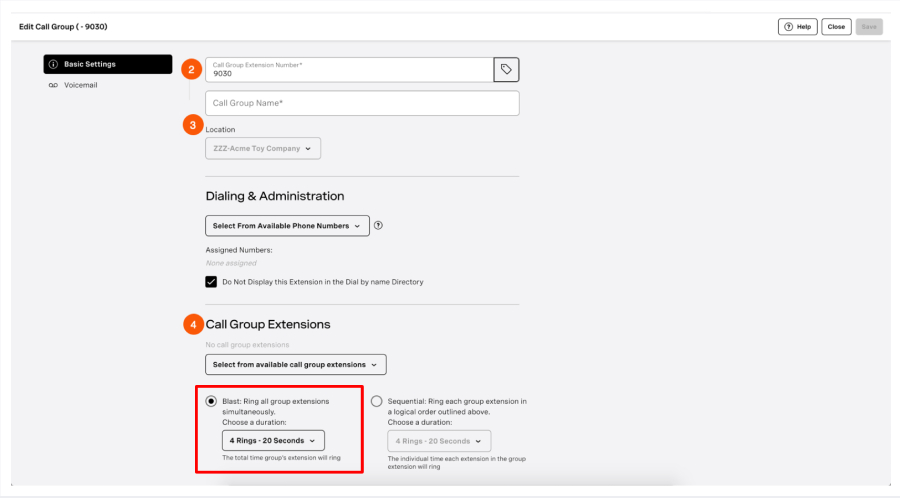
Ring several phones to avoid missing calls from customers. (Source: Vonage)
- Call rerouting: Provide excellent customer service even during emergencies. The phone system automatically distributes phone calls to active phone lines when there’s a power outage.
- Call screening: Let callers announce their names before being connected to an agent. By knowing who’s on the other end of the line, company representatives will be able to decide if they want to answer, reject, or send it to a colleague or voicemail.
- Simultaneous ring: Alert multiple devices and extensions when an inbound call comes through your phone system. This capability is part of Vonage’s Never Miss a Call features, helping businesses accommodate all customer queries.
Twilio: Best for Custom Voice Solutions

What We Liked
- Easy to set up and manage
- Comprehensive API documentation
- Voice Intelligence allows users to gather meaningful customer service insights
Where It Falls Behind
- Slow customer service
- Pricing can be expensive, especially when scaling communications
- Not ideal for businesses needing ready-to-use communication features
Twilio Monthly Pricing
- Local calls: 1.4 cents to make calls and 0.85 cents to receive
- Toll-free calls: 1.4 cents to make calls and 2.2 cents to receive
- Browser or app calling: 0.4 cents to make and receive calls
Twilio is the best software solution for building advanced IVR systems in existing business platforms. Through its voice application programming interface (API), you’ll easily customize your app and develop voice solutions with less downtime. Twilio’s IVR offers the same robust features as other platforms: call routing, artificial intelligence (AI)-powered voice assistants, and payment processing.
The disadvantage of choosing Twilio is that while its pricing follows a pay-per-use model, it can easily get expensive, especially when scaling communications. If you choose RingCentral, which also features voice and other communication APIs, you’ll access the developer platform for a flat subscription rate.
Twilio Features
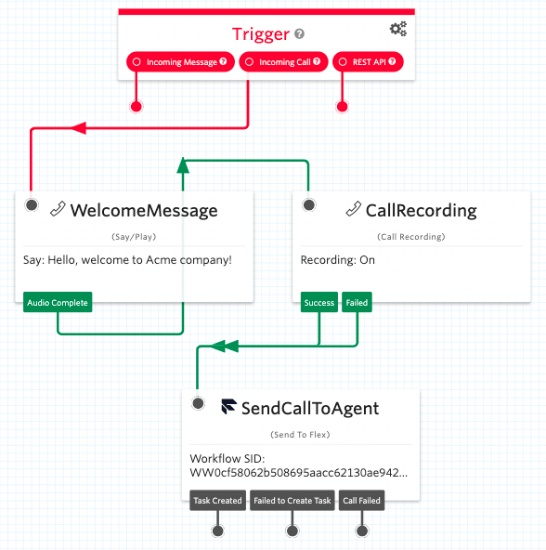
Add call recording when you build a call flow on Twilio. (Source: Twilio)
- Warm transfer: Allow team members to talk to another colleague before transferring a call. This prevents the caller from being disconnected if the other agent isn’t available to accommodate the customer.
- Text-to-speech: Convert texts to spoken audio and offer a professional greeting to customers when they get connected to your line. This removes the need for recording audio files, which takes time and more effort.
- Dual-channel recording: Document customer conversations and revisit them to take note of important details. Recordings in Twilio are stored in two distinct channels: a customer channel and an agent channel. This allows users to know who said what, making transcriptions more accurate.
How We Evaluated the Best IVR Systems
To determine the best IVR system for small businesses, we considered factors that affect small business decisions, including subscription fees, VoIP capabilities, and ease of use. Furthermore, we evaluated the software solutions’ popularity and value for money.
Learn how we evaluated the best IVR solutions by clicking on the tabs below:
15% of Overall Score
To determine the solution’s affordability, we checked if it offers a base-level subscription plan priced at less than $35 per user. We gave more points to providers with annual billing and volume discounts, as well as those offering free trials.
25% of Overall Score
Since we’re focused on the IVR system, we considered whether the vendors feature IVR at their entry-level plan. We favored those providing multilingual support and speech recognition. Because many businesses have on-the-go team members, apps compatible with different operating systems were also part of our evaluation.
20% of Overall Score
The niche features we checked were call flow designer, direct inward dial (DID) numbers, and outbound IVR system. Vendors with robust integrations received more points.
10% of Overall Score
An intuitive interface was part of our assessment of ease of use. We determined if the solutions require special know-how to set up and operate.
10% of Overall Score
Since businesses require assistance from time to time, we considered the customer service hours of each provider. We checked the communication channels they offer, giving more points to those with a variety of platforms: live chat, phone, and email.
20% of Overall Score
Our expert score includes checking each provider’s standout features, value for money, and ease of use. We included the level of popularity, considering the user reviews on third-party websites.
Frequently Asked Questions (FAQs)
The two types of IVR are inbound and outbound IVR. Inbound IVR allows callers to access information through a series of menu choices when they get connected to your phone line. It primarily focuses on providing excellent customer assistance. Outbound IVR initiates calls to customers and offers a self-service personalized IVR menu. It’s mostly used for sales and marketing initiatives.
An IVR plays a prerecorded announcement of menu options to direct callers to the right departments. Meanwhile, a voice bot is a type of next-level IVR technology that uses natural language processing (NLP) to recognize customers, understand their preferences, and provide customized solutions.
The general rule of thumb is to limit IVR menu options to a maximum of four and up to three levels only. Going beyond may confuse customers and cause them to hang up.
Bottom Line
A robust IVR system facilitates efficient call management, offering needed support for busy periods, directing customers to the right departments and agents, and collecting relevant information that speeds up the resolution of concerns. The VoIP solutions in the market have unique capabilities that make them ideal for certain business needs.
However, out of all the platforms reviewed, RingCentral stands out for its intuitive IVR editor and robust third-party integrations that make configuring call flows and handling inquiries easier. Sign up for its 14-day free trial today.